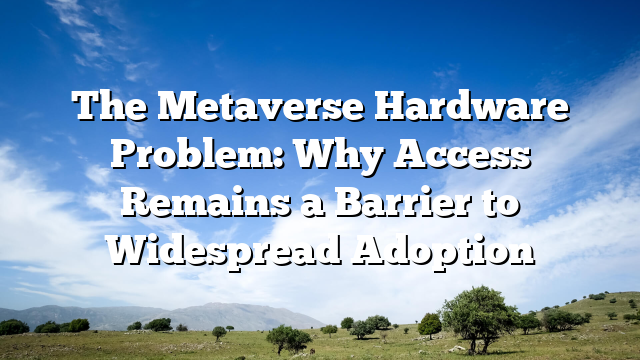The Metaverse, an idea that has attracted a lot of attention in recent years, appears to have reached a point where further development is impossible. The fact that Walt Disney Company has decided to shut down its Metaverse division is just one sign that the progress being made on creating a hyper-realistic 3D experience of the internet has reached a roadblock. In spite of all the publicity, there hasn’t been a significant amount of demand for the Metaverse, and one of the primary reasons for this is the lack of availability of appropriate hardware.
Access to the Metaverse can now be obtained in a manner not dissimilar to that of any other website, with the exception that a virtual reality headset is required. Sadly, this is an expensive, cumbersome, and difficult-to-use device that gives the wearer the appearance of being an extraterrestrial from another planet. As a direct consequence of this, the majority of people are hesitant to spend their money on such a device. It will take a significant amount of micro-processing power to make the Metaverse available to everyone. Until that power is made available, the Metaverse will continue to struggle.
It is important to note that Mark Zuckerberg made headlines in 2021 when he announced that Facebook would be renamed Meta Platforms Inc. It is worth noting that he made this announcement. The rebranding was done with the intention of reflecting Facebook’s emphasis on the Metaverse. On the other hand, since the announcement, there hasn’t been much of an expansion of the Metaverse. This is primarily due to the costs that are involved, in addition to the fact that there isn’t a significant amount of user engagement at this point in time.
The Metaverse is essentially a virtual world that enables its users to communicate with one another and conduct activities in a setting that is three-dimensional. Even though the idea has been around for some time, recent developments in technology have made it much more possible for it to become a reality. Users will be able to create their own unique avatars and communicate with one another in a digital setting that has been meticulously crafted to feel as real as it possibly can.
On the other hand, as was stated earlier, the necessary hardware to make the Metaverse available to anyone and everyone is currently too cumbersome and expensive to be practical. Before the Metaverse can become widely used, there is a problem with its infrastructure that needs to be fixed. There have been efforts made to produce hardware that is less expensive and easier to obtain, such as the Oculus Quest 2, but these devices still have a ways to go before they can be considered to be consumer-friendly.
One more problem is that there is not enough demand for the Metaverse. In spite of the fact that there has been a great deal of excitement surrounding the idea, there hasn’t been much in the way of actual user engagement. The fact that the Metaverse is still in its infancy and there isn’t a lot of content that can be accessed is a contributing factor to this problem. However, even with more content, the Metaverse will still face the challenge of attracting users who are willing to invest in the necessary hardware. This is a challenge that will exist regardless of whether or not more content is added.
In spite of all of these obstacles, there are still many reasons to have faith that the Metaverse will become successful in the long run. The opportunity for interaction with other people is one of the reasons. The Metaverse is essentially a virtual world in which individuals are able to engage in real-time conversation with one another. This may be of particular interest to younger generations, which have grown up with social media and are accustomed to engaging in digital interactions.
The ability to create virtual economies is yet another advantage that may be reaped from using the Metaverse. In the Metaverse, users are able to use virtual currencies to buy and sell virtual goods and services to one another. This may present new opportunities for entrepreneurs and small business owners who are searching for alternative methods to communicate with their clientele.
In the end, the success of the Metaverse will be contingent on the ability of developers to create an experience that is not only user-friendly but also immersive and open to everyone. To accomplish this goal will require significant advancements in both hardware and software, as well as a concerted effort to create engaging content that will attract users.
In the meantime, it is abundantly clear that there are still a great number of obstacles that need to be conquered before the Metaverse can be considered a mainstream concept. The potential advantages of the Metaverse, on the other hand, are simply too large to disregard, and it is highly likely that developers and investors will continue to work on this idea over the course of the next few years.
